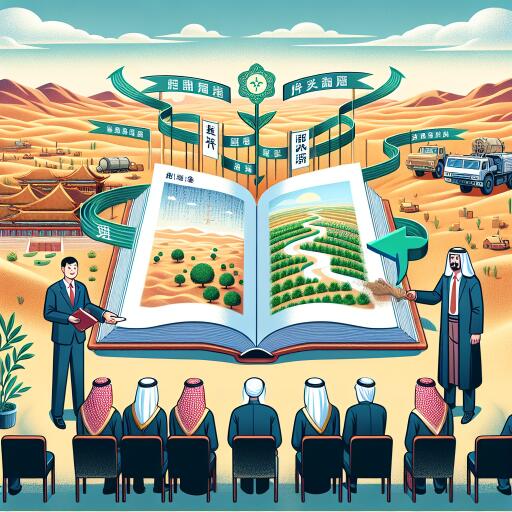
China’s Desert Control Experience Shared with Arab States
On the southern edges of the expansive Badain Jaran and Tengger deserts in northwest China, Palestinian academic Nisreen Saed Al-Qaddi, from the Palestinian Farmers Union, marveled at China’s successful desert control techniques. She observed the strategic use of sand barriers and advanced wind observation towers that help mitigate environmental impacts caused by shifting sands.
“These sand barriers play a crucial role in controlling desert expansion, and the advanced technology of wind observation towers aids in predicting environmental changes effectively,” she noted with interest.
Al-Qaddi was part of a group of over 20 international experts who participated in a technical training program in Gansu Province, focusing on innovative sandstorm prevention, oasis preservation, and ecological restoration methodologies employed in China.
Gansu Province, which possesses over 12 million hectares of sandy terrain, has been at the forefront of implementing modern techniques to rejuvenate arid land. Recent national desertification monitoring data revealed a significant decrease in desertified and sandy areas since 2015, marking improvements in the region’s ecological footprint.
During the three-week courses, experts from the Gansu Desert Control Research Institute presented their approaches for tackling desertification, which include restoring and rebuilding vegetation in dry areas, desertification control technologies for alpine grasslands, cultivating shrubs on sandy plots, and employing modern biotech solutions for ecological conservation.
The attendees also visited various desertification control initiatives, sand-based industrial locations, and experimental stations across Gansu. One such visit was to Minqin County, where innovative greening methods like drip irrigation and deploying sand barriers have boosted local forest coverage from 11.52 percent in 2010 to over 18 percent at present.
The majority of the workshop participants hailed from Arab nations grappling with similar desertification and drought issues. Mohamed A.E. AbdelRahman from Egypt’s National Authority for Remote Sensing and Space Sciences, an expert in soil science with a focus on desertification, regarded the trip as a foundational experience for his career.
“In Egypt, significant regions are plagued by mobile sand dunes, hampering economic progress, especially in agriculture. Major landmarks also face heavy sand and wind impacts,” he explained. “China’s afforestation methods and desertification control technologies offer academic solutions that we hope to implement and adapt within our own country.”
China’s journey to combat desertification began in the 1950s, leading to a remarkable reversal in grassland and shrubland degradation. This vast experience and technological know-how now serve as inspiration for countries battling similar environmental challenges.
Saudi Arabia is one such country embracing China’s expertise. Collaborating with the Food and Agriculture Organization of the United Nations, Saudi Arabia is employing Chinese techniques in a sand barrier project. “We’ve undertaken several mechanical sand barrier assessments to determine their potential in the Saudi context,” added AbdelRahman Al-Thumayri, a senior specialist from the Saudi Irrigation Organization.
Ji Yongfu, the director of the Gansu Desert Control Research Institute, emphasized, “The fight against desertification is crucial for humanity. Enhancing global cooperation in this arena is paramount.”
Since 1993, the institute has been pivotal in offering desertification prevention and control training to over 1,000 officials and academics from around 80 countries, demonstrating China’s commitment to sharing its ecological restoration expertise worldwide.





Leave a Reply